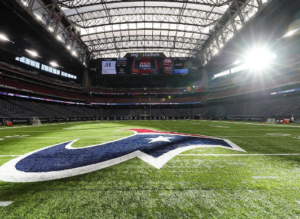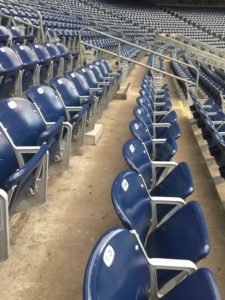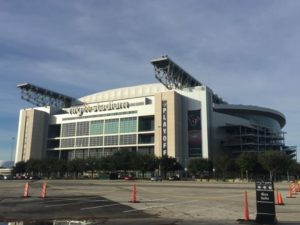Live since the start of the current NFL season, the Wi-Fi network deployed by integrator 5 Bars using Extreme Networks Wi-Fi gear has seen growth in fan usage for each subsequent game, according to David Moore, manager of information services for NRG Park.
“The first few games [of the season] it wasn’t heavily promoted, but as we went on usage shot up,” said Moore in a recent phone interview. Though he wouldn’t release specific figures on data use, Moore said that game-day totals near the end of the season saw in the range of 25,000 unique users per game, with data totals in the “4-5 terabyte” range. The stadium’s main tenants, the Houston Texans, will have at least one more home game this weekend when they host the Oakland Raiders in the first round of the NFL playoffs.
While it’s possible that the Texans could be hosting the AFC Championship game if all the higher-seed teams lose en route, this weekend’s game is most likely the last chance the NRG Stadium tech team will have as a dress rehearsal for the Super Bowl. Since the Super Bowl is historically the biggest single-day data-usage event — and has gotten bigger every year — all technical eyes will be on the NRG Stadium network, which only started becoming a reality after the stadium hosted last year’s men’s NCAA basketball Final Four. With a base seating capacity of 72,220, NRG’s Super Bowl crowd should roughly be the same as last year’s at Levi’s Stadium in Santa Clara, Calif.Fast deployment schedule met
“It was a challenge [to deploy so quickly] and we are still working out the tuning,” said Michelle McKenna-Doyle, the NFL’s chief information officer, in an email interview. “We were fortunate to have the regular season to work on it, but hope to have it Super Bowl ready within next couple weeks. 5 Bars, Extreme Networks, The Texans, Harris County and the host committee all worked hard to make it a reality for our fans.”
At one point in recent history, it seemed like NRG might never get a fan-facing Wi-Fi network since the county-owned facility couldn’t find the budget necessary to bring wireless connectivity to the venue. But with the Super Bowl approaching, a consensus finally pushed through, with 5 Bars winning a deployment bid that still needed a change in equipment from Ruckus (the original supplier in the 5 Bars bid) to Extreme. While no official breakdown of funding shares has been supplied, the reported $6 million-plus cost of the Wi-Fi deployment was likely shared in some fashion by the Texans, the NFL, Verizon Wireless and Extreme.
According to Moore, Verizon chipped in to secure guaranteed offload for its cellular customers, as well as its own SSID that will automatically sign on Verizon customers in the facility, a tactic used by Verizon in several other NFL stadiums. Non-Verizon customer fans can use a free xfinitywifi SSID, as Comcast is the backbone supplier for the Wi-Fi network services.According to Moore there are 1,250 Extreme Wi-Fi APs in the venue now, with 550 of those deployed under seats in the main bowl. While Moore said the under-seat location allows for much denser deployment and better network tuning, the method also caused the most headaches during deployment, beyond the usual cost and struggle of drilling through concrete floors.
First of all, the installers had to bring all the necessary power and cabling infrastructure in, since there was nothing underneath the concrete seat floors, Moore said. In fact, because there are offices underneath some of the seating areas, contractors had to negotiate a “drip pan” that kept moisture from seating power-washing away from the office roofing.
Another “big hiccup” emerged when the original equipment used for the under-seat locations didn’t lock out all the moisture, leading to a full replacement of all the 550 under-seat APs. Moore said the under-seat locations now use Extreme’s highest-grade outdoor-rated AP, the 3965i.
New DAS installed last year
Since Super Bowls also typically set records for cellular DAS usage, it’s no surprise that Verizon also recently updated the DAS at NRG Stadium, reportedly putting $12 million into a new system installed before the 2015 season. According to Moore, the DAS and the Wi-Fi also cover parking areas outside the venue, including a plaza where the Texans typically see 6,000 or more fans gathering before games.
“There’s great coverage” in the parking lots with the new DAS, Moore said. Announcements have not yet been made public, but you can expect that both AT&T and Verizon are busy beefing up the cellular systems in and around the stadium, as typical before any big public event.
With the dust finally settled, Texans fans and the soon-to-arrive Super Bowl fans will have good connectivity for the big day, due in no small part to the efforts of 5 Bars, which Moore complimented repeatedly for the company’s persistence and effort.
According to Moore 5 Bars had brought semi-trailers full of equipment to town ahead of the Final Four, and even used the floor of the old Houston Astrodome to roll out network inventory.
“They were working under the gun, with a limited amount of time to get it done,” said Moore of 5 Bars.









